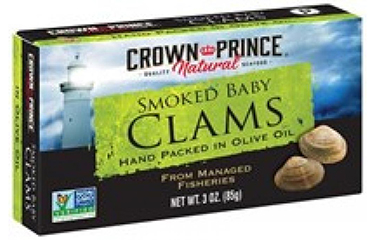City of Industry, California, U.S.A.-based Crown Prince has issued a recall of one of its canned clam products due to detectable levels of per- and polyfluoroalkyl substances (PFAS).
Crown Prince is recalling its three-ounce canned Crown Prince Natural Smoked Baby Clams in Olive Oil. The recalled product was distributed nationwide to natural food stores, grocery stores, and online retailers, Crown Prince said in a press release.
"No illnesses have been reported to date from this product. Crown Prince decided to issue the recall out of an abundance of caution after learning of the test results from FDA,” the supplier said.
In May 2022, the U.S. Food and Drug Aministration conducted a test of 81 samples of clams, cod, crab, pollock, salmon, shrimp, tuna, and tilapia, most of which were imports. The sampling was conducted after previous testing of foods found PFAS in a few seafood samples, though at “relatively low levels.”
The FDA found the highest levels of PFAS, a diverse group of human-made chemicals used in a wide range of consumer and industrial products, in samples of clams from two companies: Bumble Bee and Crown Prince. In response, Bumble Bee Foods’ recall on a specific SKU of canned clams in early July.
The FDA has said the PFAS issue represents a significant problem facing the seafood industry. In a new survey, the FDA only found levels of PFAS that were of “likely health concern” in the canned clams. In addition to Bumble Bee, the FDA also tested samples of Reese, Polar, Crown Prince, Napoleon, Roland, and Geisha brands of canned clams.
For the canned clam samples with the two highest levels of perfluorooctanoic acid (PFOA) – one of a group of chemicals known as PFAS – from two distributors, there would be a potential health concern for consumers who eat more than approximately 10 ounces of the clams per month. However young children should limit consumption to two ounces monthly, the FDA said in a constituent update.
“Research has shown that exposure to PFOA is associated with several serious health outcomes, including developmental effects, changes to liver function, reduced immune response, and increases in certain types of cancer,” the FDA said.
However, the levels of the other types of PFAS evaluated in the clams, as well as the PFAS evaluated for all other seafood samples, "are not likely to be a health concern,” the FDA said.
The agency is “working to determine the extent of PFOA in imported canned clams and PFAS in clams overall and taking action to ensure the continued safety of the U.S. food supply,” it added.
The FDA is “actively engaged” with all of the canned clam distributors that had products sampled to better understand potential sources of contamination, which could help the firms take action to reduce consumer exposure to PFOA from their products. The agency will also test imported clams and take action as appropriate, it said.
“In addition, the agency plans to conduct broader testing of canned and fresh clams, both imported and domestically harvested, to better understand PFAS levels to determine the best approach for protecting public health,” the FDA said.
The administration added that consumers should not be concerned about eating seafood overall.
“We reiterate our recommendation that you and your children eat a variety of age-appropriate healthy foods, including seafood,” the FDA said. “Seafood as a part of a healthy diet provides many nutritional benefits that for children include brain development and boosted immune system, and for adults, heart and bone health benefits, as well as help in reducing the risk of certain cancers.”
Still, Americans who regularly eat or feed their children canned clams from China may want to reduce overall intake “until we have more information,” the FDA advised.
Photo courtesy of the U.S. Food and Drug Administration







